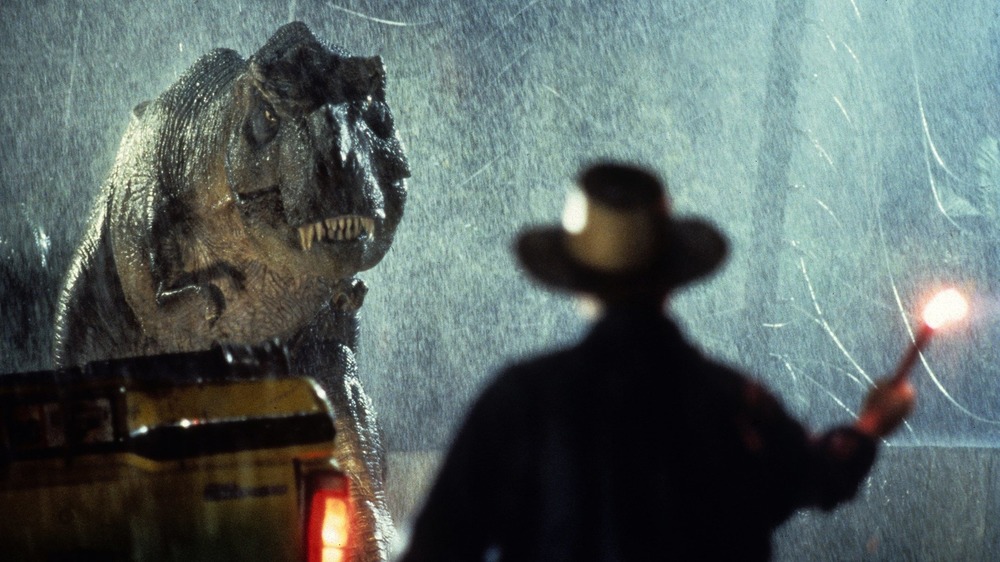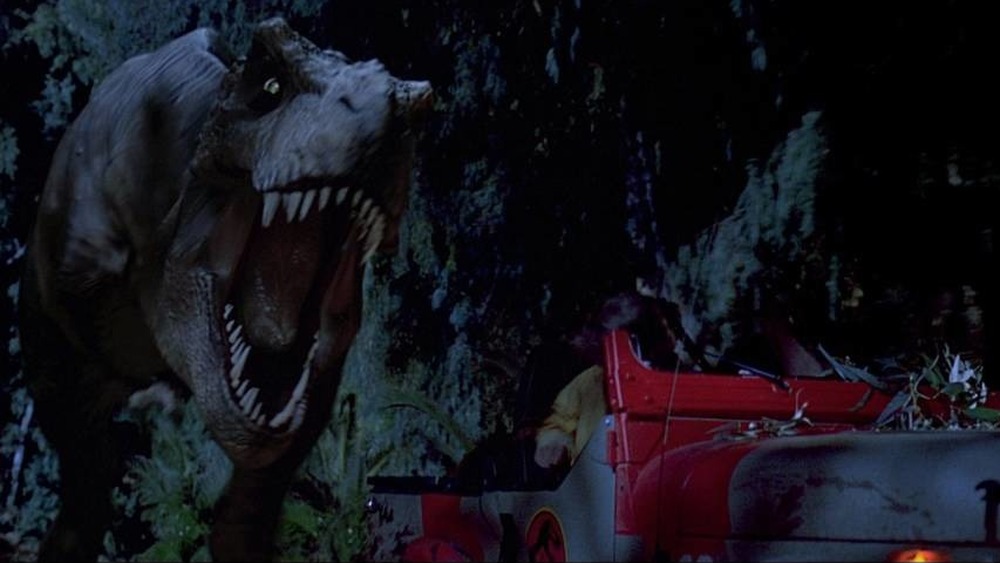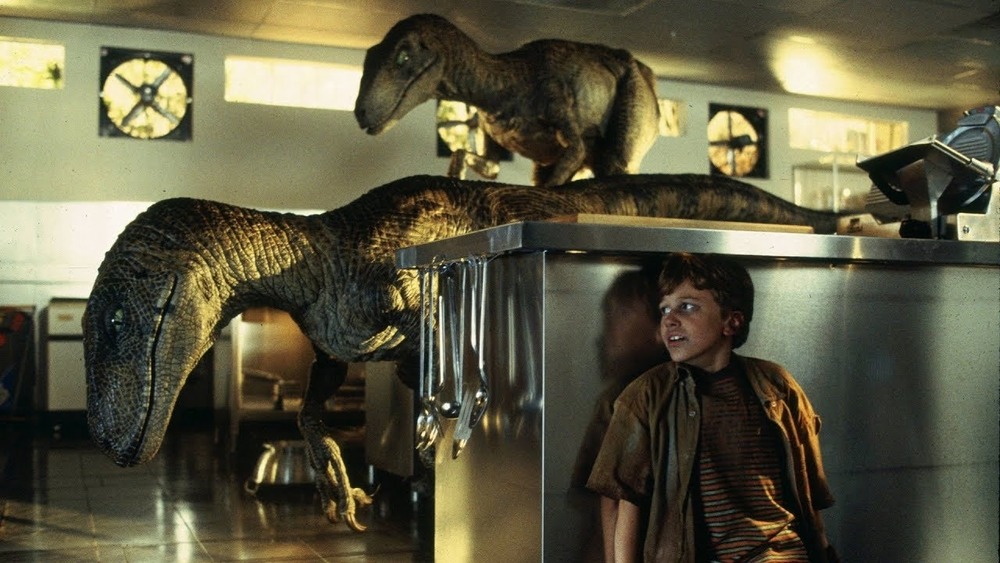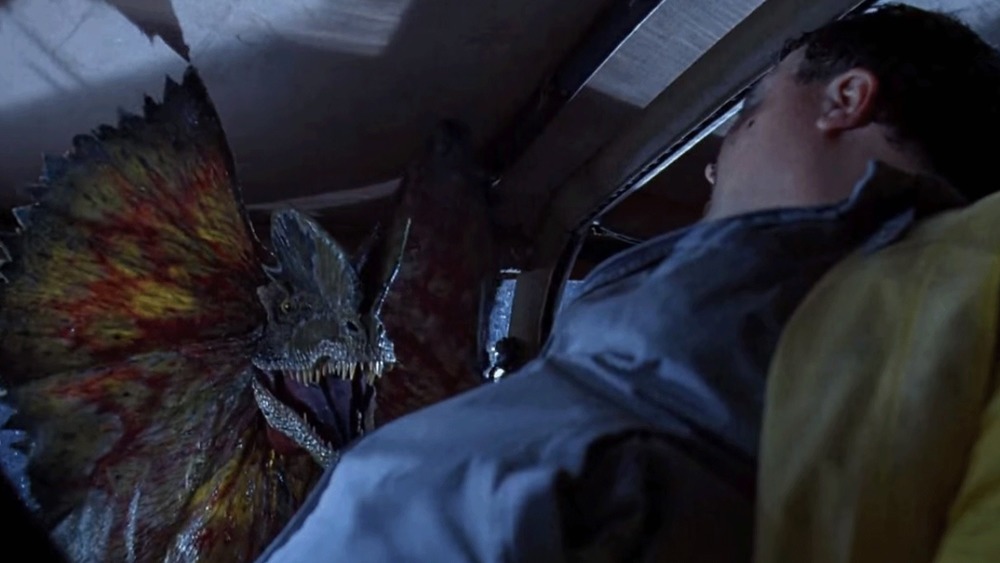The Real Reason Jurassic Park Should Be Considered A Horror Movie
Steven Spielberg's 1993 classic Jurassic Park might have been, as its famous tagline suggested, "an adventure 65 million years in the making" — but so deep was its impact on pop culture that it seems as if people will be talking about it for another 65 million years. The travails of paleontologist Dr. Alan Grant (Sam Neill), paleobotanist Dr. Ellie Sattler (Laura Dern), their colleague Dr. Ian Malcolm (Jeff Goldblum), and precocious tweens Tim and Lex Murphy (Joseph Mazzello and Ariana Richards) — the grandchildren of industrialist John Hammond (Richard Attenborough) – as they try to escape a night of rain-soaked terror in Hammond's theme park full of actual, cloned dinosaurs captivated audiences. Jurassic Park broke the box office upon its release in June 1993, spawning a franchise that lives on to this day and instilling in a generation of youths — and more than a few adults — a healthy respect for (and fear of) dinosaurs.
The flick's use of CGI, in close conjunction with animatronics courtesy of the legendary visual effects wizard Stan Winston, was groundbreaking for its time; in 1993, nobody had ever seen anything remotely resembling Jurassic Park's ultra-realistic dinos on screen before. It's also worth mentioning that in 1992, barely anyone had any idea what a velociraptor was; by 1995, they had an NBA team named after them.
Jurassic Park is remembered as a high-octane, rollicking adventure in the classic Spielberg style ... but this isn't exactly right. Sure, just like the titular park's exhibits, Jurassic Park is a hybrid, with action and sci-fi elements abounding. But at the end of the day, the flick doesn't want to thrill or intrigue you so much as it wants to scare you. Here's why Jurassic Park should be considered a horror film.
Jurassic Park contains some classic horror set pieces
There are many reasons why most of Jurassic Park's dino-tastic set pieces take place in the dark, in the rain, or both. Several of those reasons have to do with hiding the seams in the flick's CGI, and the cuts between the computer-generated dinosaurs and Winston's animatronics. However, it can hardly be disputed that — to name one obvious example — the scene in which the T-Rex makes its first appearance wouldn't have been nearly as effective if it had been staged during the daytime. Bathed only in dim ambient light, rain dripping from its dagger-sized teeth, the iconic beast brings a jolt of pure terror to the screen when it makes its first appearance. Adding to the terror is the gruesome fate of Donald Gennaro (Martin Ferrero), one of the park's investors along for the ride.
Consider also the fate of Dennis Nedry (Wayne Knight), the park's lead programmer, whose plan to temporarily shut down the park's security system so he can pilfer some dinosaur embryos for a business rival of Hammond's goes awry. In horror films, such treachery never goes unpunished, and Nedry is no exception. His demise at the razor-sharp teeth of a Dilophosaurus — portrayed rather inaccurately in the film as a roughly human-sized beastie capable of spitting deadly venom — is a horror set piece if we've ever seen one. Attacked by one of the creatures after exiting the Jeep he crashed while driving in the rain, Nedry is able to make it back inside the vehicle ... only to find that he's got company. Another one of the dinosaurs materializes, like the villain from a slasher movie, in his passenger seat.
Of course, just because an action-packed scene contains scary elements doesn't make it horror. However, if Spielberg didn't intend for these scenes to register as horror, he wouldn't have shot them the way he did.
Jurassic Park's photography and editing are pure horror
Let's not forget that Spielberg is the man who gave us Jaws (and, if some involved parties are to be believed, Poltergeist). While he's not typically associated with horror, Spielberg knows a thing or two about the genre. Consider the way in which Nedry's death scene is photographed: The Dilophosaurus' quivering frills shown in the foreground, with Nedry's terrified face framed in the center; the extreme closeup on Nedry when he's doused in venom; and the framing of the shot when the dino appears inside the car are straight from the horror playbook. The T-Rex chase scene, while full of action, also adheres closely to horror's rules of framing, composition, and pacing. The beast is often either obscured or framed in the background, and the scene movies along at a quickening pace.
This brings us to the expert work of veteran editor and frequent Spielberg collaborator Michael Kahn, who cut all of Jurassic Park's most tense scenes as if he was working on a slasher film. Both of the set pieces mentioned so far are great examples of this, but there's an even better one: the nail-biting sequence in which a pack of velociraptors hunt Tim and Lex in one of the park's kitchens. Spielberg obviously composed every shot in this sequence for maximum tension, allowing the audience to see just how effectively the beasts were boxing in their prey, and expertly using a combination of establishing shots, closeups, and quick pans. All the while, Kamen's clockwork editing slowly but surely ramps up the pace along with viewers' heart rates.
Again, these are techniques upon which horror filmmakers have relied for decades, and Spielberg certainly knew it. In our book, Jurassic Park's horror bonafides are plain — but not all fans are convinced.
Fans disagree on whether Jurassic Park is a horror movie
Over on Reddit, in the r/horror subreddit (affectionately known as "Dreadit"), user u/tcard16 posed the question of whether or not Jurassic Park belongs in the horror category. They asked, "My buddy and I were having a conversation. I was trying to argue that I can see how someone would classify Jurassic Park as horror, but he's saying I'm ridiculous. Honestly though, maybe it isn't in the same realm as Predator or Alien, but if Sharknado can be classified as sci-fi horror, then why not Jurassic Park?" Reactions were varied, to say the least.
One user, with a Reddit handle that frankly cannot be printed here, echoed our assessment. "Stylistically, it's presented as more of an action-adventure sci-fi thriller," they wrote. "There are, however, some scenes which are shot much like a horror film. [...] In some ways, it's quite a similar film to Jaws. Both films captivated and scared me s***less in equal measure when I was a child." User u/a-roh came down even more firmly on the "yes, horror," side by writing, "Absolutely it counts. For all intents and purposes, T-rex is a monster."
Meanwhile, some Redditors slapped the notion down — like u/Kaleesh_Warrior, who wrote, "Maybe it's better to state that it has horror elements, the first [two] movies at least do." User u/sick-nurse was even more blunt in their assessment, simply stating, "No, it's an action movie."
The best and most diplomatic response, though, belonged to Reddit user u/ValkyrieWeather. "Horror is [...] very personal," they wrote. "If someone found [Jurassic Park] terrifying and wants to call it horror, I'm not gonna be a gatekeeping jerk about it to them."
Now, that is a sentiment we should all be able to get behind.



